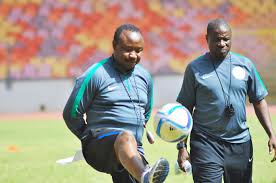
- Babangida, President, National Association of Nigeria Professional Footballers, stated this on Saturday at the Olusegun Obasanjo Stadium, Kaltungo, Gombe, venue of Hon. Karu Simon Hope League for secondary schools.
Ex- international Tijani Babangida has urged state governments to tap into grassroots football development.
Babangida, President, National Association of Nigeria Professional Footballers, stated this on Saturday at the Olusegun Obasanjo Stadium, Kaltungo, Gombe, venue of Hon. Karu Simon Hope League for secondary schools.
Government Secondary School, Filiya beat Government Secondary School, Baule-Kaltin 2-1 in the competition’s opener.
“This type of event is where you can get untapped goldmines. I have seen young boys who have the vision to become something in life. One or two of them with good training can go higher in football,” Babangida said.
“What is happening here is a historic event in Kaltungo because it’s the dream of younger players who are playing to be watched by icons. It rarely happens. Grassroots football must come deeper with the state governments. Of course, I have seen that Gombe has untapped goldmines.”
The sponsor of the tournament, and a federal lawmaker Dr Karu Simon, representing Kaltungo/Shongom constituency said, “We are resuscitating what used to be a key value in our communities while growing up. We used to know inter-college competition as it was a key event in the lives of young people, but after sometime it died. This is a basis for identifying talents. I feel this will inspire young people to walk through their purpose in life.”
Simon added that the invitation of Olympic gold medallist and World Cup star Babangida to the event was targeted at “inspiring the raw talents so that they can feel him and see him as human, not just from the television set.”
He added, “I’m excited that the governor of Gombe has chosen a young person as Commissioner for Youth and Sports, what it means is that there is a lot to come out of this with his pedigree.”



